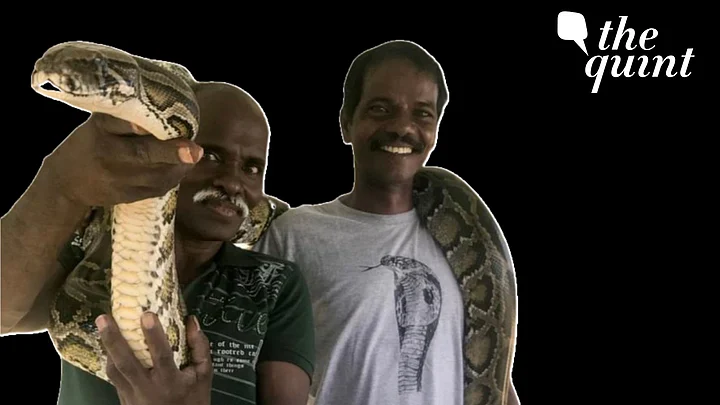Two snake catchers of Tamil Nadu – Vadivel Gopal and Masi Sadaiyan – were conferred the Padma Shri for social work in January 2023.
Gopal and Sadaiyan are members of the Irular Snake Catchers’ Cooperative Society in Chennai and catch snakes for antivenom extraction. They are also involved in international awareness and advocacy on snake-human conflicts.
But their Padma win is significant on a different level: it means a reprieve from the years of discrimination the community they hail from – the Irulas – have been facing.
Padma awardee Masi Sadaiyan's son Sugendran Masi told The Quint, "This is a huge recognition for all the hard work that my Appa (father) put in, the years of struggles he faced, and the generations of pain we have endured. It gives me immense pride as our family's profession is generally not considered respectable."
"The Padma award is not just a win for my father or our family. It is for our Irula community."Sugendran Masi
Who Are the Irulas?
Irulas are one of India’s oldest indigenous communities, and they mostly live along Tamil Nadu's north-eastern coast. They are traditionally associated with healing, natural medicine, and snake catching and have passed down their knowledge for generations.
They are well known for their ancient and intimate knowledge of snakes. However, they often face discrimination.
The Painful Past of the Irulas
The Irulas, or the Irular, are included in the Scheduled Tribes list. They are now classified under the 'Particularly Vulnerable Tribal Groups' category in Tamil Nadu.
The Irulas say they are stigmatised based on the 1952 Habitual Offenders Act, which continue to criminalise many tribes. The Act was derived from the colonial era Criminal Tribes Act of 1871, in which certain communities were categorised as criminal by birth. While the latter was repealed, the former is still in force.
A recent release, Suriya's Jai Bhim depicts police brutality against Irulas and emphasises how the caste hierarchy makes the community vulnerable.
Sugendran spoke of why the Padma award makes his family proud:
"The primary skill of our community is snake-catching, and we have immense traditional knowledge of medicinal plants and treatments. However, we engage in such practices only with a license and when we are asked to do. Otherwise, we are occupied with our daily wage jobs."
But does the Padma award really have an impact on their social and financial status? Does it help in improving the quality of their lives?
Does Padma Awards Promise a Hopeful Future for Irulas?
The Masi family now would like the government to create job opportunities that best utilise their skills.
Sugendran Masi said:
"We want the government to build schools in our locality to help our children get easy access to education. We truly believe education is the only way to break free from the shackles of caste stereotypes."
From being denounced as criminals to now being officially recognised by the government for their snake catching skills, Masi thinks Padma award has come as a massive success, though there's a long way to go.
(At The Quint, we question everything. Play an active role in shaping our journalism by becoming a member today.)
